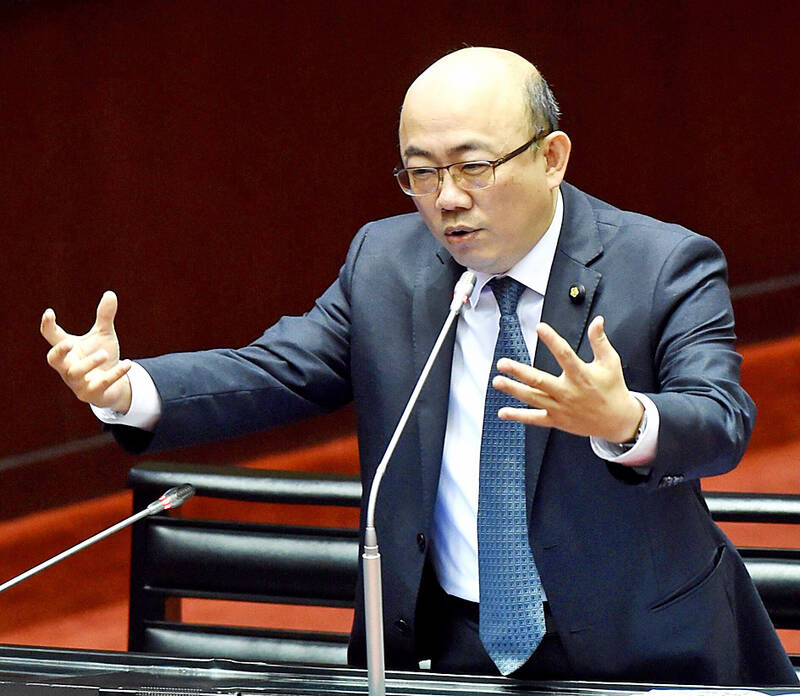The Democratic Progressive Party’s (DPP) Central Evaluation Committee on Thursday expelled 50 party members, including former legislator Julian Kuo (郭正亮) and agricultural blogger Lin Yu-hung (林裕紘).
The committee said in a statement that the 50 expelled party members either contravened party rules by campaigning for other political parties during elections or were involved in #MeToo sex scandals. It added that although some had announced they were withdrawing from the DPP, the disciplinary committee still needed to officially revoke their memberships.
The unanimous decision by the committee to expel the members was made following discussions about their conduct in the 2022 local elections and this year’s presidential and legislative elections, the committee said.

Photo: Chien Jung-feng, Taipei Times
Kuo, one of the former high-profile DPP lawmakers to get the boot, is known for his harsh criticism of the party on various political TV shows. Kuo announced his withdrawal from the DPP in May last year, saying he had gradually moved away from the party.
Lin, another well-known party member, was kicked out after being accused of enlisting people to send him hoax death threats amid controversies related to a government-funded egg import program last year.
In addition, Hung Chih-kun (洪智坤), Tsai Mu-lin (蔡沐霖) and Chen Yu-hao (陳右豪) were expelled for their alleged involvement in sexual misconduct scandals.
Meanwhile, Chou Yu-hsiu (周榆修), a former aide to DPP lawmaker Su Chiao-hui (蘇巧慧) and the ex-deputy head of the party’s youth branch, who was nominated by the Taiwan People’s Party as one of its legislator-at-large candidates in this year’s elections, was also kicked out.
In addition to the 50 expelled party members, the disciplinary committee also decided to suspend the memberships of 37 party members for a year.
Committee chairman Lai Jui-lung (賴瑞隆) said the country is facing a new set of challenges after the Jan. 13 presidential election, so the party has zero tolerance for those who contravenes party rules.
Lai urged party members to take note of the party platform and unite in the fight to safeguard Taiwan’s freedom, democracy, peace and prosperity.

Beijing could eventually see a full amphibious invasion of Taiwan as the only "prudent" way to bring about unification, the US Department of Defense said in a newly released annual report to Congress. The Pentagon's "Annual Report to Congress: Military and Security Developments Involving the People's Republic of China 2025," was in many ways similar to last year’s report but reorganized the analysis of the options China has to take over Taiwan. Generally, according to the report, Chinese leaders view the People's Liberation Army's (PLA) capabilities for a Taiwan campaign as improving, but they remain uncertain about its readiness to successfully seize

Taiwan is getting a day off on Christmas for the first time in 25 years. The change comes after opposition parties passed a law earlier this year to add or restore five public holidays, including Constitution Day, which falls on today, Dec. 25. The day marks the 1947 adoption of the constitution of the Republic of China, as the government in Taipei is formally known. Back then the Chinese Nationalist Party (KMT) governed China from Nanjing. When the KMT, now an opposition party in Taiwan, passed the legislation on holidays, it said that they would help “commemorate the history of national development.” That

Taiwan has overtaken South Korea this year in per capita income for the first time in 23 years, IMF data showed. Per capita income is a nation’s GDP divided by the total population, used to compare average wealth levels across countries. Taiwan also beat Japan this year on per capita income, after surpassing it for the first time last year, US magazine Newsweek reported yesterday. Across Asia, Taiwan ranked fourth for per capita income at US$37,827 this year due to sustained economic growth, the report said. In the top three spots were Singapore, Macau and Hong Kong, it said. South

Snow fell on Yushan (Jade Mountain, 玉山) yesterday morning as a continental cold air mass sent temperatures below freezing on Taiwan’s tallest peak, the Central Weather Administration (CWA) said. Snowflakes were seen on Yushan’s north peak from 6:28am to 6:38am, but they did not fully cover the ground and no accumulation was recorded, the CWA said. As of 7:42am, the lowest temperature recorded across Taiwan was minus-5.5°C at Yushan’s Fengkou observatory and minus-4.7°C at the Yushan observatory, CWA data showed. On Hehuanshan (合歡山) in Nantou County, a low of 1.3°C was recorded at 6:39pm, when ice pellets fell at Songsyue Lodge (松雪樓), a